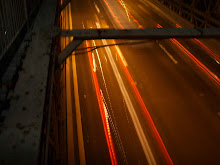| Murali meets Meera I understand |
In the middle of a large ground near home, with elaborate Ganesh pandals in their full shimmering glory in the background, was a small crew filming about 20 seconds worth of a dance sequence.
It was fascinating, because it was so typical. A really pretty, fair heroine, dressed exactly as she is in the picture above, dancing with the dude, surrounded by a lot of porki-dancing sideys who were remarkably sidey.
I may sound like an elitist talking down to the unwashed masses, but they were men with open shirts, lungis, and in desperate need of a shave. I know few women who wouldn't have quickened their step, held their purse closer and readied themselves to hear some lewd remarks at the sight of those loud shirts, banyans and bandanas.
To be fair, there was nothing vulgar about the scene. And the actors may have been perfectly well behaved. But it annoyed me an awful lot.
Once again, here was an example of popular culture engineered to elicit a few whistles from some men in the audience using a frankly detrimental portrayal of women. No, it was not a little harmless fun, and make believe at that - it was just another instance of objectification of women on screen.
Of course, she was dressed in 'Western' wear, which obviously means She Was Asking For It (NO, she NEVER ever is).
Reams have been written about the hypocrisy that characterises the depiction on women on film, given the oppressiveness faced by women in everyday life, (“You’re wearing that and heading out?!”) and everyone seems to think we should learn to live with it, but we really shouldn’t have to, and cinema like this doesn’t help the cause.
Few people may watch this “harmless” film. It’s not even unique in how it paints women. But the larger issue is not as benign.
It matters how women are shown on screen
I love the seeming empowerment of women in many films and how comfortable a lot of narratives are with female sexuality. But this is few and far between.
In a recent interview on Salon, author Gail Dines talks about the effects of society getting sex education and its understanding of relationships with the opposite sex, through increasingly violent images in the media. (Elsewhere, she's been called an "anti-porn zealot", but I thought these were interesting points.)
She specifically discusses porn, (Should we worry whether porn has hijacked our sexuality, September 11, 2010) but the argument stands for much of the cinema in India. To see women as objects, she says, is to see them (us?) “not as somebody to have relationships with, but as somebody to do something to.”
Like bum pinch them on the street perhaps?
She also talks about the how violent sexual imagery, “takes control of the discourse around sexuality.” I blame the reels of films, which are the often the most accessible means of sex education and information about sexualised behaviour, and having scant respect for the heroines, in part at least, for continuing the categorisation of anyone who doesn’t dress traditionally as lacking in morals and being “indecent”.
“It’s not our culture”? Bollocks. Just an inability to look at women as beyond a shiny commodity.
PS - It was traumatic looking for links and images to movies that would illustrate my points. Even with a moderate search on, it is incredibly insulting, and scary, to see the language that accompanies every video/ photo of an actress that has been posted.
PPS - This piece doesn't even begin to discuss the problematic depiction of male sexuality in film; sticks only to a very small section of regional cinema; and condemns a movie based on 20 s that could never make it past the edit table. But still.





2 comments:
Bravo - well said!!! its something that needs to be shouted loud and often. Seems like the whole world needs a good education.
Hey, Were'nt both of us whistling??!
Post a Comment